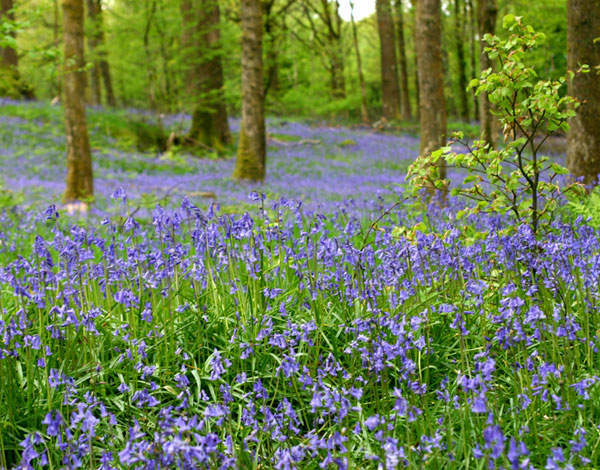

A FIR FIGHT
In fairy tales, foresters are usually jolly fellows, perhaps negligent in the matter of their children, gingerbread and witches’ ovens but generally considered to have a lot of fun in the open air. I don’t know about modern foresters; life may weigh more heavily on them.
While trees are beautiful things, they grow so slowly that it will be decades before the saplings that the forester puts into the ground reach maturity — he could well be dead before they do. And by then, the world might have changed so much that the original point of his plantations will have been forgotten. Talk about the vanity of human endeavour.
I was reflecting on this in Devon recently. In front of me was a shoulder of Dartmoor cloaked in green. A buzzard flew along the valley, below my vantage place. I was with the Woodland Trust, and opposite was the 825-acre Fingle Wood, which they are trying to buy. Hidden among the conifers, they told me, were the remains of an ancient woodland which once throbbed with biodiversity and might again, if only some of the fast-growing Douglas fir could be removed.
Down in the valley, along the bank of the river, the vegetation changes every few yards. So pure is the air that the lichen on the oak trees grows as thick as a fur coat. But on the slopes of the hill, the odious fir trees stand so closely together that nothing grows in the gloom of the forest floor.
Britain has little forest cover compared to continental Europe. The great partly virgin Carpathian forest in Romania seems to go on for ever — although irresponsible logging, some of it illegal, is making sad inroads, as Prince Charles will tell you. Our forests are handkerchiefs by comparison, but the ancient woodland is a rare treasure in terms of the species it contains. Clearly, we have to make the most of what we have. My Woodland Trust friends need to raise £2.5 million to make the purchase; perhaps some kind reader of Spear’s will help them out.
We walked on, past some pheasant pens. There we saw a monolith remembering a forester who had worked on this estate for 44 years. He was the one who put in the Douglas fir, planted so closely as to destroy — quite deliberately — the oak coppice that had preceded it. Evil! But there were grants to do it; it was national policy. Now his work, done according to the priorities of the time, will, if the Woodland Trust gets its way, be unpicked.
This won’t be so easy; some of the banks are steep. Trees that were planted at the beginning of the 20th century are ready to harvest — but getting them out would be far more costly than the value of the timber. That’s not the reason for doing it. The tiny parcels of ancient woodland that survive in Britain are our equivalent to the Amazon rainforest — supporting a unique, if less colourful, biodiversity. Quite something for walkers.
Timber land
But my, how ideas about woodland have changed. The Normans loved forests; they hunted in them. They weren’t, however, forests in the modern sense so much as glades. Most of the primeval forest had long been cleared and in its place had come rigorously husbanded woods. It was a wooden world. Everything was made from timber; nothing went to waste. The medieval ‘woodwards’ didn’t manage their woods for beauty. They simply made sure there was plenty of timber.
The rot had set in by the Jacobean period. John Evelyn, the 17th-century diarist, worried so much about the shortage of timber that he wrote a book about it, called Sylva. Admiral Collingwood, who took over from Nelson at the Battle of Trafalgar, used to walk around scattering acorns from his pockets, in the hope that they would grow up into mighty oaks that would build men-o’-war. But the trees from those acorns had not grown very tall before the Navy discovered ironclads.
Our lack of timber was made painfully apparent during the First World War. Fortunately, France had superb forests. In 1919, the Forestry Commission was founded to boost Britain’s timber production. They used to be regarded as villains for planting unsympathetic conifers all over the Lake District, Welsh hills and mountains of Scotland. Now the public regards them as part of the nation’s family silver. Woods are as sacred to our age as they were to the druids. The new religion is leisure.
I wish the Woodland Trust well at Fingle Wood. Open up the forest canopy. Let in the spring. But remember, too, that timber also serves a practical purpose. People a century ago couldn’t foresee the conditions of today. We of today don’t know what needs will be a century hence.






